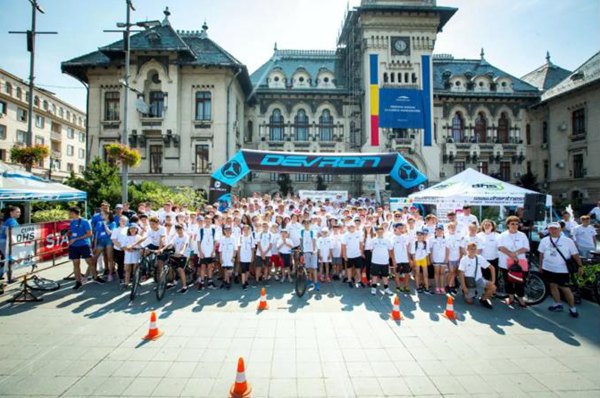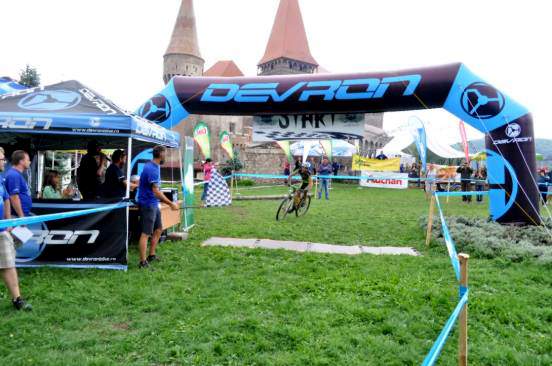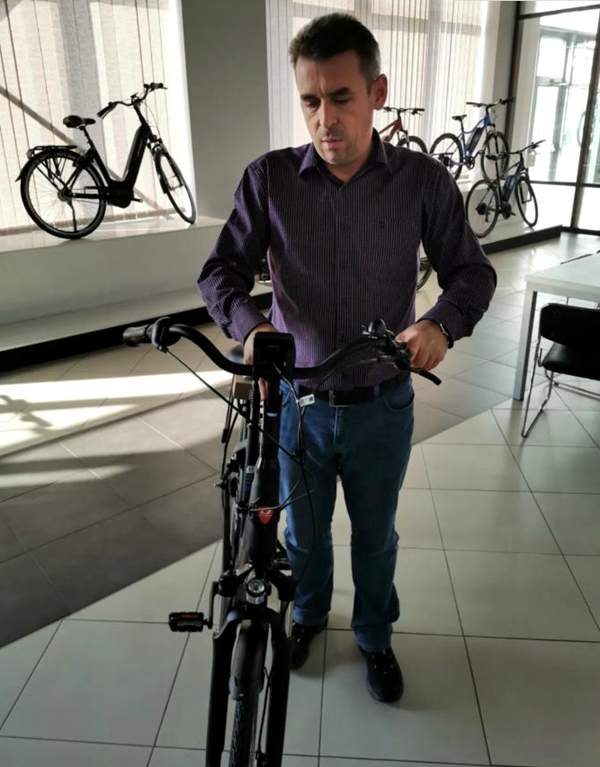Spreading the Joy of Cycling in Romania
by Song Ran
[Romania] Gelu Fona
The central square of the city of Pitesti on the Arges River bustled with activity as the finals of the keenly contested DHS Cup Youth Bicycle Obstacle Race kicked off at the prominent venue. There were teenaged cyclists intently circumventing the various obstacles placed on their tracks, such as steps, slopes, pipes, bollards and even flagpoles.

It was a display of cycling skills as they focused on their efforts, striving to better their best, and looking triumphant when they overcame an obstacle.

A group photo of the cyclists participating in the race
A large number of passersby had stopped to watch the riveting scene and their cheers mingled with the laughter of the teens rang out among the ancient buildings around the square, lending vigor and vitality to the ancient tranquil city.
Cycling Makes Life Better
The DHS Cup race is a public welfare annual cycling competition specially designed for Romanian primary and secondary school students. Founded and sponsored by Eurosport DHS S.A. (DHS), it promotes a healthy lifestyle and creates awareness of traffic rules to prevent traffic accidents.
When the event first began, only nine of the 41 provinces in Romania sent representatives to participate and the number of cyclists as well as the scale of the race were unremarkable. Now, however, more than 20,000 racers from more than 30 provinces have signed up for the event.
Julius, a teacher from Cluj County in the northwest, has been leading his school team to the race every year since the very beginning. This year, his cyclists entered the finals. "I teach traffic safety to my students because safe riding is very important and the children need more safety awareness, riding skills and emergency knowhow," he said, talking about his work and the original purpose behind bringing the team to participate in the race. The silver-haired, spirited Romanian elder spoke highly of the race that has been held for years.
"I started to follow similar cycling races long ago since such races can improve children's riding skills and adaptability. The DHS Cup race is very people-oriented and well organized. I am deeply impressed," Julius said, praising the Chinese organizer for the joy the annual sporting event brings to the children.
A deputy mayor of Pitesti, who also watched the race, spoke about how significant the event was. He said, "The municipal government strongly supports the DHS Cup because the race is good for children's physical and mental health. It gives them a chance to exercise, make friends and take a break from the computer screen and video games. Thanks to the race, the awareness and popularity of cycling has spread. Romania's environmental protection undertakings have also benefited from it."
The fame of the DHS Cup has made DHS a household name. In 1998, entrepreneurs from Ningxia Hui Autonomous Region in northwest China set up DHS. They benefited from the preferential policies of the city of Petrosani in Hunedoara County in western Romania, which offered investors exemption from import tariffs on equipment, raw materials and parts. In 1999, when the company formally started production, its annual output was more than 10,000 bikes.
The moderate pricing and a sales model which focuses on large supermarkets, outlets and centralized procurement has made DHS' market share grow and its brand well known. To promote riding, DHS has been urging major Romanian cities to build bicycle lanes so that residents can get around in an environment-friendly way with convenience and safety. It has also actively promoted an electric bike-sharing project in the west-central city of Alba Iulia to alleviate traffic congestion and pollution.
The company has made environmentally-friendly cycling part of the local life and brought convenience to residents, helping to make Romania more livable and beautiful.
Sharing Development Dividends
With Romania becoming a member state of the European Union in 2007, DHS' business environment has undergone profound changes. The broader market brought unprecedented opportunities, while increased competition created greater challenges. Expanding production, upgrading products and adapting to EU rules became urgent tasks.
To enhance production capacity and research and development, the most pragmatic way was to collaborate with major bicycle manufacturers in Europe, and the company's first choice was between France and Germany. However, even after several months of consultations and negotiations, DHS' search for partners was not smooth, mainly because these manufacturers were not optimistic about the prospects and product quality of a Chinese company.
Then Prophete, a German group, showed interest in cooperation.
"In the beginning, we weren't sure if we should cooperate with DHS, but they did have a great influence in Romania, and the public welfare bicycle race sponsored by it was also very famous and had great potential. What really impressed us was the tenacity and effort of this Chinese company in pursuing the best results and its enthusiasm for spreading the joy of cycling," Prophete founder Loenne said,talking of how they made the initial contact with DHS.
With the capital and more advanced technology injected by the German company, DHS entered the fast lane of development. In 2006, it built a new plant with a designed production capacity of 1 million bicycles in Deva, a city in Hunedoara, which became the largest bicycle production base in Europe.

A panoramic view of the DHS factory in Deva, Hunedoara County
Having expanded its scale and secured a stable market, DHS turned to its next task – upgrading its products. As the Netherlands and Spain lead the world in the cycling culture and bicycle design, DHS embarked on a journey of finding more partners. "This time, the cooperation was very smooth. After all, DHS had accumulated enough influence and many companies were willing to work with it to design new stylish, practical and durable models," Loenne said, adding that he thought DHS would continue to make new history.
As the first step toward that, DHS hired young people who love cycling and even professional cyclists to join its R&D team. It also held national professional mountain bike competitions and set up a cycling team, capturing the competitive sports model and outdoor sport model markets. "The quality of DHS mountain bikes is on par with the top brands in Europe," said Giuliano, a cyclist who rides a DHS bicycle, adding that he was very satisfied with it.
Next, DHS made innovations in core technologies in shock absorbers, transmissions and the double-layer aluminum wheels. Subsequently, it launched two high-end brands: Devron, which mainly manufactures mountain bikes, road bikes and electric bicycles; and Smart Baby, which mainly produces baby strollers, walkers and trolleys.

A professional mountain bike race sponsored by DHS
"This group of Chinese partners always have unexpected good ideas. They seem to be competing with themselves and keep making breakthroughs," Loenne remarked. He said he was glad that he chose to cooperate with this Chinese company with such unlimited potential instead of treating it as a competitor. GHS also launched an e-commerce platform and realized synchronized online and offline sales, achieving a spurt in sales that year. Its products are a hit not only in Romania, but it also exports to 26 other countries in the European Union, reaching as far as Cyprus.
DHS has completely won over its German partner. Earlier, Prophete was unable to enter the Dutch market directly but now it has made it with ease through collaboration with DHS. "I can entrust all orders to DHS without any worry," Loenne said, praising the hard work and wisdom of the Chinese company.
In 2018, DHS paid more than 10 million euros (USD10.98 million) in taxes, becoming a major taxpayer in Hunedoara. Over 90 percent of its bicycles are sold in other countries in Europe. It has sold over 300,000 electric bicycles, becoming the largest manufacturer of electric bicycles in Europe.
Technical Director from a Mine
David, the technical director of DHS, is responsible for technological R&D, quality monitoring and new product configuration. A key management staff at the company, he has been with them for nearly 20 years, growing from a production line worker to the backbone of management.
Years ago, David was a miner in his hometown and knew nothing about bicycle assembly and parts production. He had never set foot in a bicycle factory until DHS did a recruitment drive in his area. Liu, a manager from Shandong Province in east China was responsible for giving technical training to the recruits. Liu, while vastly experienced, had little patience with slow learners. "When David joined us, he was just 25 or so. He didn't talk much, and he was so slow that I often wanted to scold him!" Liu said, talking about the days when he mentored David. "However, then I saw that though he worked slowly, he was also indomitable, and he always used his brain to make things better. He worked on the production line for three years, acquired experience in every position, and took every job seriously."
The management appreciated David's down-to-earth attitude and diligence, trained him and promoted him as production line leader. David continued to work conscientiously. He was goodtempered, had the nerve to assume responsibilities, and always helped the management to solve problems.
Through years of hard work, David grew and matured with DHS. He was as committed to the factory as he was to his family. Once, when checking the parts on the production line, he found there were fewer seat posts than there should have been. He checked carefully and discovered that a worker named Gabi had mixed up the product with another. He took Gabi to task in front of the other workers. No one had imagined that David, who was always so amiable, could become so angry and speak so loudly. Some of them thought he was making an unnecessary fuss and began to avoid him. Then David patiently explained to them why he acted the way he did. "When I think of the interests of the factory, I am actually thinking of the interests of every one of you," he told them. "If some parts are missing or are mixed up with something else, the factory will suffer losses. If the factory goes bankrupt, we will lose our jobs." Gradually, people understood his way of thinking. Although the factory bosses are from a place as remote as China and the employees are from many countries, the factory is home to everyone. David's outburst unexpectedly strengthened the unity in the factory.

David checks a new bike
DHS gave David many training opportunities. In 2002, he was sent to China to study bicycle R&D systematically. After the collaboration with Prophete started, it chose David to lead the technical team that would interact and hold exchanges with the foreign design experts. In this way the former miner grew into a high-end talent knowledgeable in advanced bicycle production and R&D technology.
"I am so glad that I walked out of the mine and joined DHS,and I am grateful for the company's training and help. The reason I have been working for this company for 20 years, from Petrosani to Deva, is because it gives me greater prospects and opportunities and makes my life better and better," David said, talking about the turning point in his life in 1999 and his subsequent course of growth.
David is an example of how the Romanian local employees are gaining development opportunities. Trained by DHS, many have become managers, technicians or marketing experts. Currently, DHS employs more than 600 local people and indirectly provides more than 1,000 jobs. In addition, it cooperates with the Transylvania Institute of Technology in Romania to offer students internships and jobs in its bicycle factories. Even if these graduates do not work at DHS in the future, they will still learn practical skills, which will stand them in good stead in their future career development.
With its enthusiasm and perseverance, DHS has not only achieved success in business and development but also won the recognition and respect of Romanians. The deputy mayor of Pitesti said he hopes that more Chinese companies like DHS come to Pitesti to invest, establish factories, and manufacture high-quality products that will serve the Romanian market and export to other European countries, enhancing local employment. He also hopes that Romania can cooperate with China in building transportation infrastructure such as bridges and roads and in many other sectors.
FOR MORE
Project Overview:
Eurosport DHS S.A. is the largest bicycle manufacturer and seller in Romania, a household name and a large taxpayer. It also has the largest manufacturing base of high-end bicycles and electric bicycles in Europe. Besides Romania, its products are very popular in Germany, the Netherlands, Denmark, Italy, France, Hungary and many other countries. DHS also provides great support to Romania's sports development. It is a longtime sponsor of sports events such as the Four Nations Junior Women's Gymnastics Tournament in Deva, the Youth Obstacle Bicycle Race and the Mountain Bike Cross-Country Race. It also sponsors the Inter-Art International Art Camp in the city of Aiud in Transylvania, and in 2007, sponsored Romanian journalists and police officers to participate in WISPA Beijing 2007, the international indoor soccer tournament.
DHS is also actively involved in Romania's public welfare undertakings. It has donated relief supplies to families affected by floods in the southeast, provided toys, baby carriages walkers and other things for children's homes, and presented bicycles, stationery and other supplies to students in economically underdeveloped areas to help improve their lives and facilitate their education.


